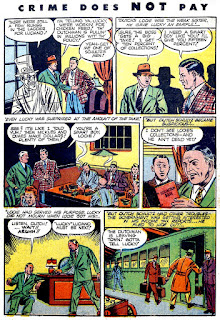Charles “Lucky” Luciano was born Salvatore Lucania in Sicily, Italy, in 1897. At age 9 he emigrated to America with his parents, and over a lifetime made his reputation as the man who helped create modern day organized crime. You can read a lot about Luciano through various internet sources. This version of his life is from Crime Does Not Pay #26 (1943), and gives a version of Luciano’s life up until he went to prison in New York State. There was a lot that went on with Luciano after he went to prison, including a commutation of his sentence for “compulsory prostitution,” to help the Americans with the war effort in Italy. It didn’t help him, though, because he remained persona non grata in America until he was safely dead in 1962, when his relatives were able to return his body to New York for burial.
Of necessity this 13-page story glosses over much, but is essentially correct. It does not mention prostitution. It shows Lucky getting stabbed by three men in a gruesome and sadistic torture attack that left him permanently scarred, but censors itself by not mentioning that he was imprisoned for running a prostitution racket.
The Grand Comics Database does not guess who drew the story. It looks like it was worked on by diverse hands. Like organized crime.
Translate
Wednesday, August 31, 2016
Monday, August 29, 2016
Number 1938: Sub-Mariner: Crocodile tears
A short but pleasing Sub-Mariner story from the mid-fifties incarnation of Sub-Mariner, drawn by his creator, Bill Everett. A 100-foot croc is roaming about Brazil, so Namor and his gal, Betty, go south to find it. It is probably the only time I have ever seen the cliché, “crocodile tears,” illustrated. That was Everett; he had a sense of humor.
(I am writing this well in advance of the 2016 Olympic Games in Rio de Janeiro, but what folks are worried about in Brazil is a tiny mosquito that can cause a terrible problem. It does not take great size to cause great disaster.)
From Sub-Mariner #33 (1954):
(I am writing this well in advance of the 2016 Olympic Games in Rio de Janeiro, but what folks are worried about in Brazil is a tiny mosquito that can cause a terrible problem. It does not take great size to cause great disaster.)
From Sub-Mariner #33 (1954):
Friday, August 26, 2016
Number 1937: Happy 104th birthday, Tarzan!
In 2012 I posted Tarzan #155, which was an adaptation of Edgar Rice Burroughs’ novel Tarzan of the Apes, first published in 1912. I did it to observe Tarzan’s 100th anniversary, and for the 104th anniversary I have the same adaptation, taken from the same comic, as an educational tool in the form of a school workbook.
It was designed and produced by Glen Johnson, at the time a teacher at the Intermountain Indian School in Brigham City, Utah. For many years Navajo children were taken from the reservation and taught at boarding schools under the aegis of the Bureau of Indian Affairs. The system was well-meaning but often racially insensitive, and it was ultimately closed down. Glen is a comics fan, and made many contacts with newspaper syndicates and comic book artists to secure permission to use comics as teaching tools. I have probably forgotten the whole story behind this workbook (Glen gave it to me when it was published in 1972, and memories fade), but I recall that Glen knew artist Russ Manning. The workbook is from stats made from the original art. The stats for the story were prepared for the reprint in Gold Key‘s Tarzan #178 (1968).
After page one of the story I have included one of Johnson’s worksheets the students filled out. I am showing it as an example; every page of the story is accompanied by such a worksheet.
The cover of the workbook was drawn by a local artist, Ned Young, then a teenager, who is now a professional artist and illustrator. You can see his modern work at the Ned Young Studio website.
My 2012 posting of the color comics version. Just click on the thumbnail.
Subscribe to:
Comments (Atom)


















































